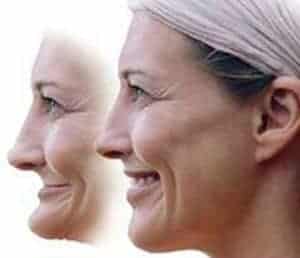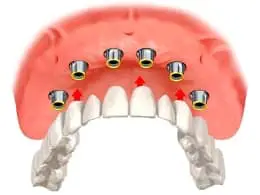I”ve had dentures for almost 30 years and can no longer keep them in my mouth. Are they worn down and I just need a new pair or do I have something more serious going on?
Kelly
Dear Kelly,

Wearing dentures leads to a condition known as facial collapse
Re-doing the dentures won’t fix your problem. I’m afraid my answer to your question is there is something more serious going on. When your teeth were first removed and you were fitted for dentures, your body recognized you no longer had any teeth. As a result, it came to the conclusion you no longer needed your all of your jawbone to retain the teeth roots and began to resorb the minerals in your jawbone to use elsewhere in your body. This causes your jaw to slowly shrink leading to what you are now facing— facial collapse.
You don’t have enough jawbone left to provide a ridge for your dentures. This is why they are not staying in place. The solution to this is two-fold.
Step One: You will need to have bone grafting done. This is a surgical procedure where an oral surgeon or qualified dentist will build back up the bone in your jawbone.
Step Two: You will then need to have a new replacement made for your missing teeth. You could get dentures again, but I’m going to suggest a better, more permanent solution.
Preventing Facial Collapse with Implant Overdentures
Instead of getting dentures again, which will just restart the cycle of mineral and bone loss again, I would like you to consider dental implants, using implant overdentures. With dental implants, a prosthetic tooth root is placed in your jawbone Then a dental crown is placed on top. The implant signals to your brain there are still teeth there and no minerals are leached from your jawbone to use elsewhere leaving it firmly intact.
It would be too expensive to do a dental implant for each and every missing tooth in your situation. Instead, I suggest you have implant overdentures made. These require four to six implants be placed and then anchored to your newly made dentures. Not only will you find this prevents facial collapse, but you will find your chewing capacity and quality of life with your bite go up significantly.
This blog is brought to you by Atlanta Periodontist Dr. David Pumphrey.








